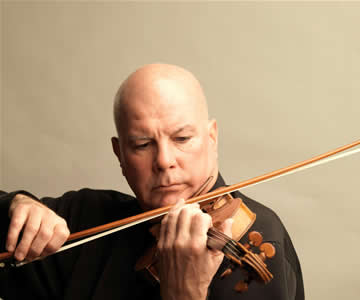Installment No. 2 of the Eastern Music Festival’s faculty orchestra concert in Dana Auditorium featured three works, including the world premiere of A Journey by EMF Music Director Gerard Schwarz. Also on the bill were two stalwart staples of the romantic literature: Dvorák’s Violin Concerto and Strauss’ Also sprach Zarathustra.
The origin of Schwarz’s new composition is the result of a commission by his close friend David E. “Dave” Gannett, who asked the conductor to write an orchestral work in memory of his late wife, Barbara. Although Gannett had something the size of an overture in mind (about 12 minutes long), Schwarz responded with the longest piece he has ever written, a 5-movement symphonic poem. Each movement of the 25-minute work depicts aspects of Gannett’s life.
The opening Introduction, according Schwarz, focuses on childhood. The second movement (Solemn; Spirited) depicts the journey from childhood through adolescence. The third-movement (Chorale) highlights the love between Dave and Barbara. The fourth movement (Ceremonial) describes military life while the final (Tribute) is a homage.
The score is complex and richly varied; Schwarz has an unerring ear for tonal color and explores both the intimate and the extroverted in the unfolding of the work. Especially distinctive are numerous solos for practically every first-chair player in the orchestra; in the hands of EMF faculty, these were beautifully played.
Other distinguishing moments include the hushed, quiet strings that were overpowered by unexpected loud orchestral outbursts; textures that became increasingly thick, eventually flowing into climaxes of Mahler-esque proportions; and the final major chord resolution.
It seemed obvious that the audience enjoyed hearing a creative work from a man who is esteemed as a conductor. Even more appreciative, however, was the orchestra, fervent in its appreciation of A Journey, evidenced by enthusiastic stomping of feet and tapping of bows, recalling Schwarz back to the stage several times.
Internationally renowned violinist Elmar Oliveira joined the orchestra for a stirring reading of Dvorák’s three-movement Violin Concerto in A minor, Op. 53, penned in 1879. The opening dramatic statement from the orchestra provided a springboard for Oliveira to give a quick overview of his formidable persona — perfect intonation, a hearty, warm sound coupled with the technical ability to take chances and move freely within the structure of the score.
The first-movement Allegro leads directly into the Adagio second movement, a wonderful essay in lyricism; the soloist’s playing entreated the audience to enjoy the lush proceedings. The finale is chock-full of wonderful dance rhythms that became part and parcel of Dvorák’s characteristic style.
There are few better known or more powerful introductions than the one that opens Richard Strauss’ 1896 tone poem, Also sprach Zarathustra, partly because of Stanley Kubrick’s use of the score in his iconic film 2001: A Space Odyssey. The EMF orchestra gave this rousing opening its full due, with dead-on trumpet and brass playing with huge crescendos from the entire orchestra.
It may be helpful for the listener to know some of the philosophical ideas presented by Nietzsche upon whose work of the same title Strauss wrote his 30-minute tone poem, but one can enjoy the scope and magnificence of the score without having a hint of the philosopher’s writing. Indeed, Strauss noted that his piece is “freely after Nietzsche,” and that his work is intended to capture the mood more that the argument of Nietzsche’s poem.
I have often thought that post-romantic music (like Zarathustra) is what the EMF Festival Orchestra relishes — something the ensemble can really sink its teeth into. That feeling was born out as the strings ecstatically soared throughout the score, the winds frolicked with color and energy, the brass provided solid foundation and heroic bluster, and, of course, the large percussion section made sure each detail was clearly highlighted. And through it all was the inspired conducting of Schwarz, urging, cajoling, and sweeping the ensemble from incredibly soft passages to overwhelming climaxes.











